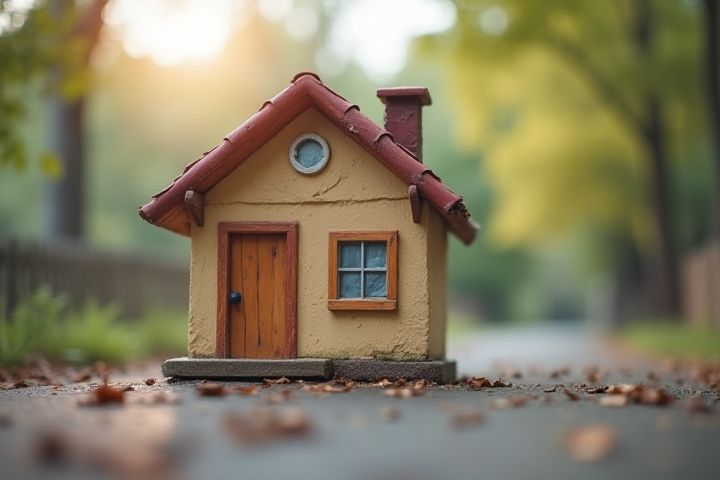
First, determine the rental price by researching local market trends and analyzing comparable listings in your area. Next, prepare your home for potential tenants by ensuring it meets safety standards, is clean, and includes necessary repairs or upgrades. Create an appealing listing that highlights the property's best features, such as its location, amenities, and nearby services. When screening potential tenants, conduct background checks and verify their rental history to ensure reliability. Finally, draft a clear rental agreement that outlines all terms, including rent due dates, maintenance responsibilities, and security deposit requirements, to protect both your interests and those of your tenants.
How To Rent Out A House
Research local rental market
Researching the local rental market is crucial for successfully renting out your house. Analyze comparable properties in your neighborhood to determine optimal pricing and demand trends, focusing on factors such as amenities, square footage, and proximity to schools or public transport. Utilize online platforms and tools to gather insights on average rental rates, vacancy periods, and tenant demographics in your area. Understanding the rental market will help you set competitive rates, attract quality tenants, and maximize your rental income.
Set competitive rental price
To set a competitive rental price for your house, start by researching local rental market trends and examining similar properties in your neighborhood. Utilize online platforms like Zillow or Rentometer to compare prices based on factors such as size, location, and amenities. Consider adjusting your pricing based on the condition of your house, seasonal demand fluctuations, and any unique features that may justify a higher rate. By accurately pricing your property, you can attract more potential tenants and reduce the time it remains vacant.
Understand landlord-tenant laws
Understanding landlord-tenant laws is crucial for anyone looking to rent out a house, as these regulations govern the rights and responsibilities of both parties. Familiarize yourself with local statutes that cover lease agreements, security deposits, and maintenance responsibilities to ensure compliance and protect your investment. You should also be aware of fair housing laws to prevent discrimination during the tenant selection process. By being informed on these legal requirements, you can create a safer and more transparent rental experience for both you and your tenants.
Prepare the property
Preparing your property for rental involves several critical steps to attract potential tenants and secure a successful lease. Start by ensuring the property is clean, well-maintained, and freshly painted, as a visually appealing space can significantly increase interest. Consider making necessary repairs, such as fixing leaks, updating appliances, or replacing worn-out flooring, which can enhance the property's overall value and functionality. Implement safety measures, like installing smoke detectors and ensuring a secure entry point, to comply with legal standards and increase your tenants' peace of mind.
Create a detailed rental agreement
Creating a detailed rental agreement is essential for protecting both your interests and those of your tenants. Include key components such as the duration of the lease, monthly rent amount, due date, and late payment penalties to ensure a clear understanding of expectations. Specify property rules, maintenance responsibilities, and tenant obligations, such as notification of repairs or subletting policies, to prevent potential disputes. Remember, your rental agreement should comply with local laws to ensure enforceability and provide a fair framework for your rental relationship.
Screen potential tenants
Screening potential tenants involves thoroughly assessing applicants to ensure they are reliable and responsible. First, require a comprehensive rental application that includes personal information, employment history, and references. Conduct background checks that cover credit history, criminal records, and rental history to evaluate their financial responsibility and behavior as a tenant. Finally, consider scheduling personal interviews to gauge their compatibility with your rental property and address any concerns they may have.
Collect a security deposit
When renting out your house, collecting a security deposit is essential for protecting your property against potential damages or unpaid rent. Typically, this deposit ranges from one to two months' rent, and you should clearly outline the amount in your rental agreement. Make sure to inform tenants about the conditions under which the deposit may be withheld, such as excessive wear and tear or missed payments. Remember to abide by local laws regarding security deposits, including proper handling, documenting conditions, and the timeline for returning the deposit after the lease ends.
Arrange maintenance and repairs
Before renting out your house, it's essential to arrange for thorough maintenance and necessary repairs to attract quality tenants. Start by conducting a comprehensive inspection of the property, focusing on critical areas such as plumbing, electrical systems, and HVAC units, ensuring everything is in optimal working condition. Address any cosmetic issues, such as paint scuffs or flooring damage, to enhance the property's curb appeal and livability. By investing in these updates and timely maintenance, you establish a strong landlord-tenant relationship built on trust and reliability, ultimately contributing to a smoother rental experience for both parties.
Consider landlord insurance
When renting out a house, consider obtaining landlord insurance to protect your investment and mitigate potential risks. This specialized policy typically covers property damage, liability claims, and loss of rental income, ensuring you are financially secure during tenant vacancies or unforeseen issues. Carefully review policy options to find coverage that suits your property's specific needs and your risk tolerance. Investing in landlord insurance not only safeguards your asset but also provides peace of mind as you embark on the rental process.
Advertise the property effectively
To effectively advertise your rental property, utilize online platforms that cater to housing listings, such as Zillow, Craigslist, and Facebook Marketplace, which together reach millions of potential tenants. Create an engaging description highlighting key features like square footage, number of bedrooms and bathrooms, and any recent upgrades or amenities like a backyard or modern appliances. Professional-quality photos can greatly enhance your listing, so include at least 15 high-resolution images showcasing each room, exterior views, and nearby attractions. Consider offering virtual tours or video walkthroughs to give prospective renters an in-depth view of the property, significantly increasing interest and engagement.
